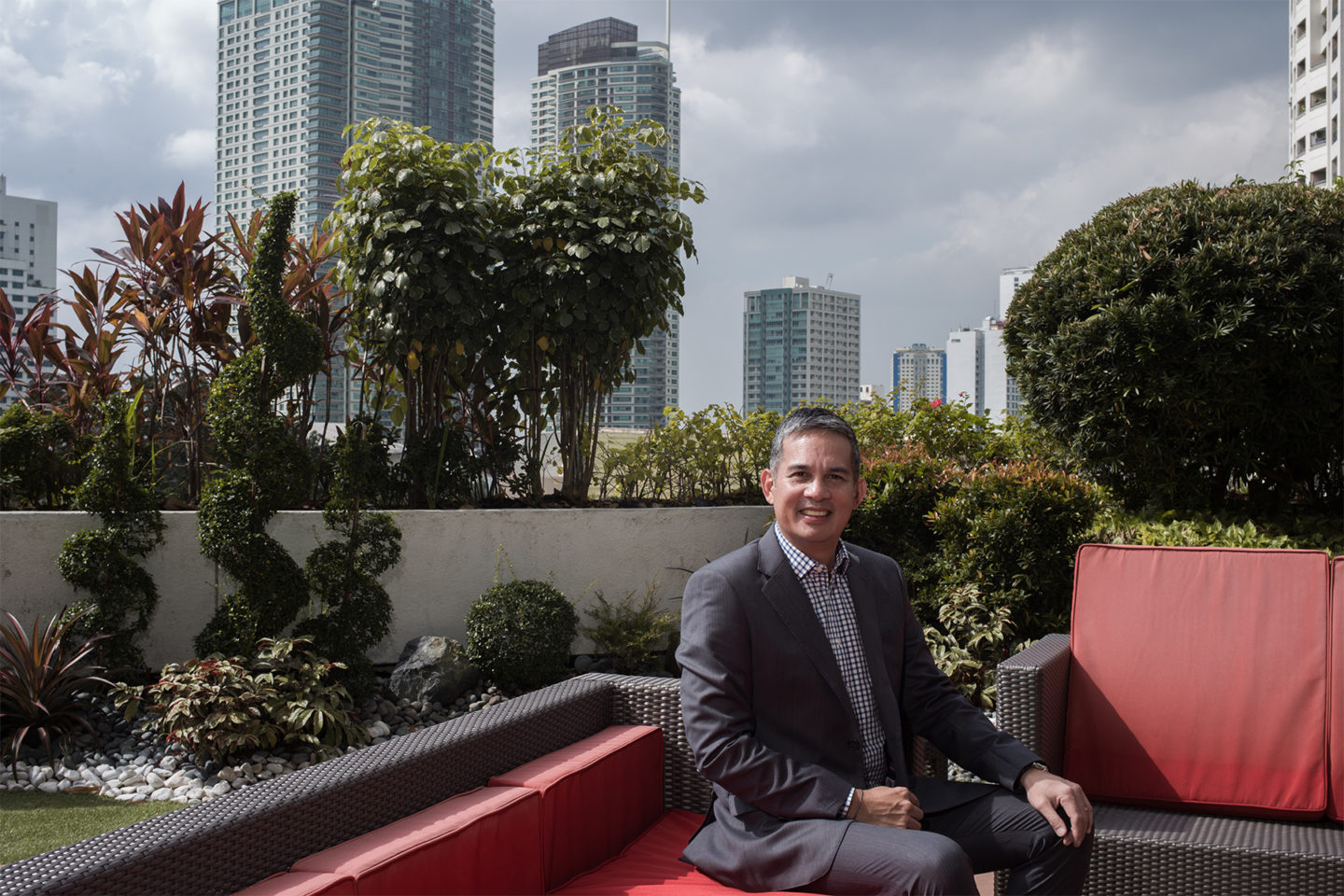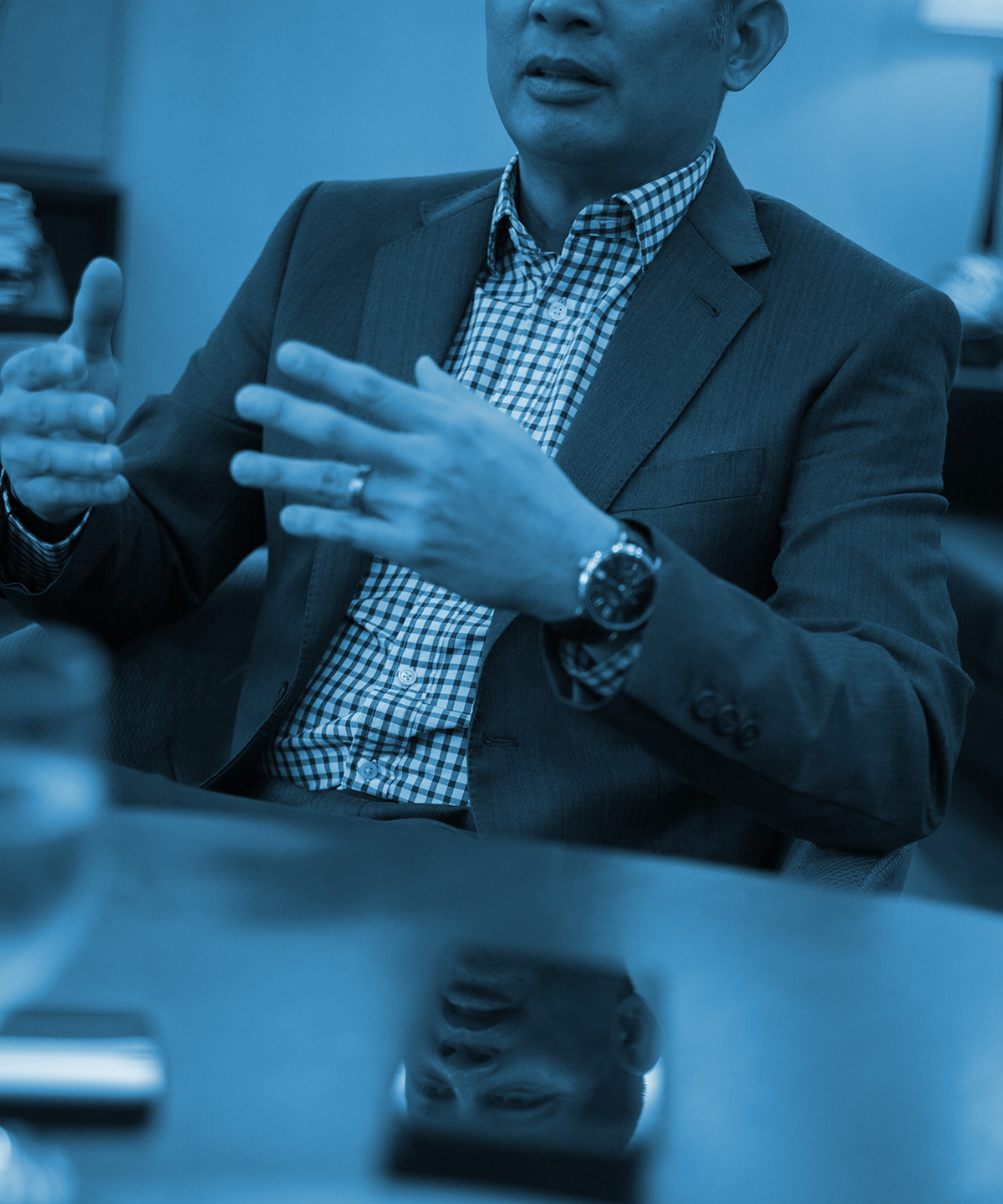Article
Ars Ducendi: The Gospel According to the Customer
 February 05, 2020
February 05, 2020
PLDT-Smart’s new boss Al Panlilio is confronting new challenges through an unparalleled focus on the customer
In the busiest district in the Philippines, Al Panlilio’s office is an oasis.
Outside is a carpeted area whose walls are adorned by some of the finest paintings done by Filipinos. Hanging beside his desk are large fine-art photographs taken by his wife Angela. Five steps away from his desk is a doorway to an outside area where he has set up couches surrounded by some greenery. When one remains in that office until nighttime, one could witness the city of Makati going to sleep one office light at a time.
Harmony may well be the most important value in Panlilio’s life. The man wears a substantial number of hats. One moment, he is President of the Samahang Basketbol ng Pilipinas—focused on developing the strongest possible national basketball team. A few hours later, he might put on his MVP Sports Foundation hat, providing systematic, efficient, and significant support for Philippine athletes.
Of course, there is also the newest—and perhaps the weightiest—hat: that of Chief Revenue Officer of PLDT and Chief Executive Officer of Smart.
Going through his resume evokes Hollywood and its numerous actor-director-producers. The only difference is: Panlilio doesn’t work on a per project basis. Each of his responsibilities requires decisiveness and velocity every single day. The pressure he deals with in one day could be equal to the pressure many of us deal with in a month. It makes sense that his office is a sanctuary. It is a call to calm down and think with clarity. Perhaps, it is a reminder that a boss’s job isn’t simply to direct, but to listen, observe, and, ultimately, harmonize.
Al Panlilio himself has a warm and calming aura. His voice is the type that invites you to a casual cup of coffee, and not to meetings—to conversations, and not sermons. By tone alone, the message to the other person is: “Relax. We’ve got this.”
This is the demeanor of someone intent on reshaping one of the country’s biggest corporations. This is the sound of someone standing in the chaos of the modern digital world, coolly directing traffic. It’s almost no wonder that—when asked about his approach to his new role—Panlilio responds with every possible synonym of “harmony.”

One of his favorite words? Teamwork.
“It’s because I was in the basketball team as a student,” Panlilio says. “You can really apply the values you build in sports in the corporate world, especially in team sports. Michael Jordan didn’t start winning until he understood the team concept. A number of memorable championship teams in the NBA have inspiring taglines that encourage teamwork. The ’08 Celtics had ‘Ubuntu’. More recently you have the Golden State Warriors who had ‘Strength in Numbers’.”
This may be how Panlilio deals with four or five different jobs at the same time. When one hears him speak about work, it seems he’s mastered the art of applying the same core values to varying gargantuan tasks, to great success. Sure, there might be a vast difference between winning a basketball game and running a billion dollar enterprise, but what they require from leaders is the same.
“I still adhere to a lot of values I gained from sports—teamwork, a singular objective, understanding your role, improving yourself every time, and knowing your role and doing it. It’s no different from collaboration in the workplace.”
Al Panlilio obviously doesn’t make his team run laps in the office, but the discipline, humility, and sports influence is clear. Coaches, for instance, tell their teams to “keep talking.” Every player on the floor needs to know what his teammates are doing in order to make sure that their defense has no glaring holes. Panlilio has joined PLDT-Smart with a similar call: “Communicate.”
“I’m more of a collaborative leader,” Panlilio says. “I can’t do things alone. There has to be collaboration across the different business units. Sure, we’re the revenue guys, but we’re just the tip of the spear. Everybody should be working toward the same thing.”
“It’s okay to have diverse opinions. We need to talk,” he continues. “Even heated discussions are welcome. The important thing is we talk and assign value to everyone’s roles. The quickest way to fail at my job is staying in a silo.”
“This is why I make a conscious effort to extend my hands to other groups.”


"For example, I tell Network that—for us to be successful—we need to work closely together. Network connectivity is hygiene. The service has to be delivered to the customer. So what’s a productive way for us to give input that can result in optimal return? That’s always the million-dollar question. Another example is Shared Services. Since I came in, I’ve told them: ‘Let’s work together early. If you have a new product in mind, let’s talk about it as early as possible so we can get all insights from everybody.”
“My only ask is for everybody to be in the room discussing these issues and ideas. Our mindset is one of an enabler. We want to have a holistic and cohesive approach to problem solving, with a primary mindset of:
‘How can I enable you?’”
The challenge in any big corporation is finding common ground among the numerous A-type personalities. It is always interesting to hear business leaders talk about how they’ll harmonize the many dissonant voices in the company’s meetings rooms. Panlilio has taken a strong first step in this regard, emphasizing one clear and simple focus area: the customer.
“If I can rally everybody to the ‘customer experience’ mindset, that’s an early win,” he says. “That’s the unifying mindset: customer centricity. You have to hear what the customer is saying. We live in an era where internet access is a basic right. There’s pressure on us to be as ubiquitous, accessible, and invisible as oxygen. That’s what we need to provide. I know each business unit has unique concerns, but if we can all get a little better at putting ourselves in the customer’s shoes, that’s a good start.”
If customer centricity is the message to the company, then what is the message to the customer? For Panlilio, it’s also pretty direct.
“I think we have to apologize for our shortcomings. They deserve better,” he says. “It’s imperative for us to really focus on improving our quality of service. They have a choice. The first step for us is to look the man in the mirror: We have a lot of things to improve.”
“One focus for me is to improve our installation and repair efficiencies. It’s when we neglect these areas that churn happens. If we reach 80,000 installations, but also churn out 80,000, then what have we really done? Operational discipline is a big part of this. Once we win over a customer, the more important and grueling task is to keep him happy as long as we can.”
“That’s where our focus is. We need to first admit that we have a problem. It’s only when you recognize there’s a problem that you can look for a solution.”
One is almost reminded of a classic monologue from HBO’s “The Newsroom.” Jeff Daniels tells a hall full of shocked people that America is no longer the greatest country in the world. But it used to be. And it still could be. When Al Panlilio talks about his role, he exhibits a similar degree of honesty and hope. It’s difficult not to be inspired. One cannot wait to see how it will turn out.
What motivates a man to take on such difficult tasks? What keeps a person going?
It’s never easy to find quick or satisfying answers to such philosophical questions. Who climbs mountains anymore simply because they are there—without the promise of a highly viewed Instagram story? In the modern world, our motivations intermingle, and it’s no different for Al Panlilio.








